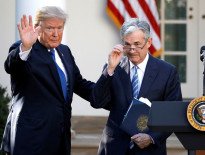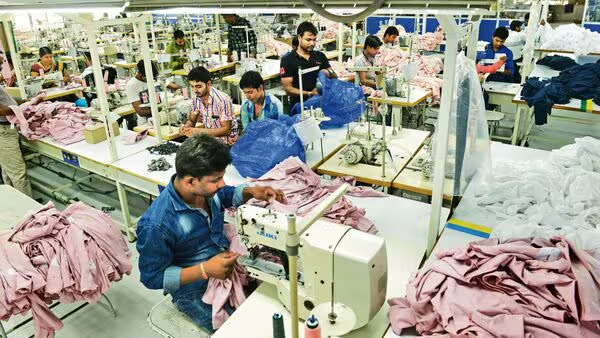Hey, like this? Why not share it with a buddy?

This economic downturn has significant geopolitical implications for the world’s third-largest economy. Domestically, it has already resulted in political turmoil. Germany, the third-largest economy in the world, boasts a nominal gross domestic product of $4.7 trillion in 2024, according to the International Monetary Fund. With a population of 84 million, it ranks ahead of Japan, which holds the fourth spot with a $4.07 trillion economy and 124 million people. India follows in fifth place with a GDP of $3.9 trillion and a population of 1.4 billion. Japan’s population is shrinking by 0.5% annually, while Germany’s has been growing at 0.8-1% per year, driven largely by the influx of immigrants, including those fleeing wars in Ukraine, Africa and Syria. Germany’s economy remains stagnant compared to its level five years ago.
By contrast, the economy of the United States is 10% larger than its pre-pandemic size; Japan’s has grown about 3%, China’s 25% and India’s by about 30%. Germany’s economy, however, is projected to shrink in 2024 and 2025, marking a two-year recession. This economic downturn has significant geopolitical implications for the world’s third-largest economy. Domestically, it has already resulted in political turmoil. Chancellor Olaf Scholz’s Government fell after losing a parliamentary vote of confidence last month. Early elections are now scheduled for February, instead of September. The fall of Scholz’s Government followed the collapse of the three-party coalition, triggered by the pro-business FDP’s decision to break away from the SDP and the Greens. This rift was exacerbated by the surging popularity of the ultra-right-wing, anti-immigrant party AfD (Alternative for Germany), which made huge gains in the elections in the two provinces of Saxony and Thuringia. Founded in 2013, the AfD’s rapid rise reflects a global trend of populist politics intertwined with xenophobia.
How did Germany get to this situation and does it have lessons for others?
The China factor: Well into the 21st century, Germany was the biggest exporting economy and had a symbiotic trade relationship with China. Germany was exporting high-value capital goods, machinery, automobiles and chemicals while importing consumer goods from China. But China has since become a competitor, even producing German luxury cars domestically.
The Eurozone debt crisis: The 2011 European sovereign debt crisis, following the 2008 global financial meltdown, the Lehman crash, forced Germany to lead massive bailouts for countries like Portugal, Ireland, Italy, Spain, and especially Greece. That rescue became necessary to prevent a widespread banking collapse and more so since German banks were heavily exposed to the sovereign debt of the Southern European countries. It could also be said that it was payback time. Germany had enjoyed the benefits of euro currency unification since 1999. Since the erstwhile German currency mark was much stronger in the Euro regime, Germany had a de facto undervalued currency. This significantly helped its exports, making it a powerhouse with a large trade surplus.
The Ukraine war:
Germany’s reliance on cheap Russian gas ended with the destruction of the Nord Stream gas pipeline, leading to soaring energy costs and gas shortages. Additionally, Chinese overcapacity is leading to global dumping of goods, undermining German export competitiveness. While Germany’s manufacturing exports might revive at least in value terms, if not in volumes, it faces longer-term challenges adversely affecting its productivity growth. An IMF report has highlighted the real problems for Germany: its ageing population, low public investment, red tape and unreformed bureaucracy. Germany’s working-age population will decline by nearly 1% in the next five years, unless offset by immigrants, to which the AfD is vigorously opposed. The public investment-to-GDP ratio over the last few years is one of the lowest among OECD and European countries, hampered by strict fiscal discipline laws. German exports to the US, which are robust as of now, run the risk of high tariffs from the Trump Government. The markets for German goods are shrinking due to global competition led by China. Even Volkswagen is closing three factories within Germany.
Most importantly, Germany trails in digital technology, artificial intelligence and software services. German economist and columnist Wolfgang Munchau, in his book, Kaput, argues that Germany’s growth model is broken. He attributes this decline to the mercantilist policies followed by the industrial and political elite, dependency on Russia and China and failure to innovate in emerging sectors and digital technologies.
This year is one of increased uncertainty. What will be the economic and trade policies of President Trump? More protectionist and mercantile, hurting everyone? How will Russia come out of the huge burden of the cost of war? Interest rates are at 21% in Russia and inflation is soaring. Will China be able to arrest its slowdown? This is the geopolitical and geoeconomic landscape, against which the German economy must show its resilience. Is the gloom talk about its decline overdone? Only time will tell.
Source : https://www.deccanherald.com/opinion/germanys-great-slowdown-3345554
Related Posts
RECENT POST
- Pack.Nxt 2025 Concludes with Actionable Conversations Shaping the Future of Packaging
- INTERACTIVE MEETING WITH CHAIRMAN, IRDAI
- After labour codes rollout, Centre to double down on job-intensive sectors in FY-27 budget
- SME FINANCE SUMMIT
- Exploring Better Economic and Diplomatic Relations Between INDIA AND CHINA








